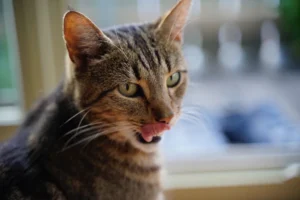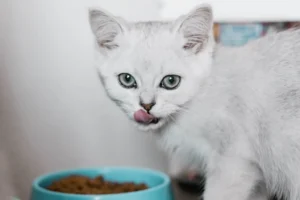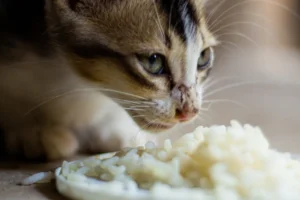Cats can be cute, cuddly companions, but why are so many of them overweight? Let’s explore the reasons behind this common issue that affects our feline friends.
Overfeeding:
How overfeeding contributes to cat obesity
Offering too much food or too many treats can easily lead to weight gain in our feline friends. It’s tempting to show love through food, but it’s essential to remember that portion control is key. It’s important to follow feeding guidelines provided by your veterinarian based on your cat’s individual needs.
Cats have a reputation for being picky eaters, but in reality, they will eat whatever is available to them. Free-feeding, where food is constantly available, can lead to overeating. Instead, feeding scheduled meals can help control portion sizes and prevent overeating.
An additional insight to consider is that measuring food can make a significant difference. Using a measuring cup or food scale ensures that you are providing the correct amount of food, preventing accidental overfeeding.
Lack of Exercise: ## The importance of exercise for cats Just like humans, cats need regular exercise to maintain a healthy weight and overall well-being. Cats that are sedentary or lack physical activity are at higher risk for obesity. Providing interactive toys, climbing structures, and playtime can encourage your cat to stay active.
Regular play sessions can serve as a dual purpose – bonding with your cat while also promoting physical activity. Remember that indoor cats especially need opportunities for exercise, as they may not have the same level of activity as outdoor cats.
Age: As cats age, their metabolism slows down, making them more susceptible to weight gain if their diet and activity level are not adjusted accordingly. It’s important to monitor your cat’s weight as they age and make any necessary adjustments to their diet and exercise routine.
Consider switching to a senior formula cat food that is lower in calories but still provides the necessary nutrients for aging cats. Additionally, ensuring that your older cat stays active through gentle play or interactive toys can help maintain a healthy weight and keep them mentally stimulated.
How age can impact a cat’s weight
As cats age, their metabolism tends to slow down, making it easier for them to gain weight. Just like humans, older cats may become less active and require fewer calories. Therefore, it’s crucial to adjust their diet accordingly to prevent excess weight gain. Additionally, age-related conditions such as arthritis can impact a cat’s ability to exercise, further contributing to weight gain.
Common health conditions that can contribute to cat obesity
Several health conditions can lead to weight gain in cats. One common culprit is hypothyroidism, a condition where the thyroid gland doesn’t produce enough hormones, slowing down the metabolism. Other medical issues like diabetes, kidney disease, or hormonal imbalances can also result in weight gain. It’s essential to work with your vet to diagnose and treat any underlying health problems that may be affecting your cat’s weight.
Environmental Factors:
- Unrestricted feeding: Leaving food out all day can lead to overeating in cats. It’s essential to measure out the appropriate amount of food for your cat based on their age, weight, and activity level.
- Lack of exercise: Cats need regular exercise to stay fit and healthy. Providing toys, climbing structures, or interactive play sessions can help keep your cat active and prevent weight gain.
- Stress: Just like humans, cats can also stress-eat. Changes in their environment, routine, or the addition of a new pet can lead to emotional eating. Ensuring a calm and stable environment for your cat can help prevent stress-related weight gain.
Remember, maintaining a healthy weight is crucial for your cat’s overall well-being. By understanding the factors that contribute to feline obesity and taking proactive steps to address them, you can help your furry friend live a long and healthy life.
Environmental factors that may lead to cat obesity
Cats can easily pack on the pounds when their living environment doesn’t encourage healthy habits. One common factor is free feeding, where food is constantly available, leading to overeating. To combat this, establish set mealtimes for your kitty. Lack of physical activity due to a sedentary lifestyle can also contribute to weight gain. Make sure to provide your cat with engaging toys and playtime to keep them active. Stress and boredom can also play a role in overeating, so create a stimulating environment with plenty of toys and interaction. By addressing these environmental factors, you can help your cat maintain a healthy weight.
How breed can affect a cat’s likelihood of becoming overweight
Certain cat breeds are more prone to weight gain than others. Breeds such as the Scottish Fold, Ragamuffin, and Persian cats have a higher predisposition to obesity. These breeds tend to have a slower metabolism and may have a genetic tendency towards weight gain. It’s essential to be mindful of portion control and exercise for these breeds to prevent obesity. Regular veterinary check-ups can also help monitor your cat’s weight and overall health. By understanding your cat’s breed and its unique needs, you can better manage their weight and prevent obesity.
Owner Behavior:
- Overfeeding: One common mistake owners make is overfeeding their cats. Be mindful of portion sizes and follow feeding guidelines to prevent excess calories.
- Lack of exercise: Owners who don’t prioritize playtime and physical activity for their cats may contribute to obesity. Ensure your cat has opportunities to stay active and engaged daily.
- Inconsistent feeding routine: Cats thrive on routine, so establish set mealtimes to prevent grazing behavior that can lead to weight gain.
- Ignoring weight gain: Cats can hide weight gain well, so regularly weigh your cat and monitor their body condition to catch any changes early. Pro tip: Use a body condition chart to assess your cat’s weight accurately.
The impact of owner behavior on a cat’s weight
Cat owners play a crucial role in their feline friend’s weight management. One common mistake is free-feeding, where food is constantly available, leading to overeating. Instead, establish a feeding schedule and portion control to maintain a healthy weight. Avoid giving in to those pleading eyes for extra treats; stick to recommended portions. Additionally, engaging in interactive playtime with your cat can promote exercise and prevent weight gain. Be mindful of your cat’s overall well-being by monitoring their weight and adjusting their diet accordingly.
Tips for preventing and addressing cat obesity
Quality Nutrition : Opt for high-quality cat food that meets your pet’s nutritional needs without unnecessary fillers. Consult with a veterinarian to determine the best diet for your cat’s weight management.
Regular Exercise : Incorporate playtime and interactive toys to keep your cat active and engaged. Physical activity is essential for maintaining a healthy weight and overall well-being.
Monitor Portion Sizes : Avoid overfeeding by measuring your cat’s food portions and sticking to a consistent feeding schedule. Avoid free-feeding to prevent excessive calorie intake.
Veterinary Check-Ups : Schedule regular check-ups with your veterinarian to monitor your cat’s weight and overall health. Early detection of weight issues can lead to effective prevention and treatment plans.
Behavior Modification : Address any emotional or stress-related issues that may contribute to overeating or weight gain in your cat. Seek guidance from a professional to help modify these behaviors effectively.
Fun Fact:
Did you know that a cat’s metabolism slows down as they age, making it easier for them to gain weight? Keep an eye on your furry friend’s weight as they get older to ensure they stay healthy and active.
A surprising fact about cat obesity
Did you know that indoor cats are more likely to be overweight than outdoor cats? This is because indoor cats have less opportunity for exercise and may be prone to overeating out of boredom. So, if your feline friend is a couch potato, it might be time to get them moving with some engaging toys or interactive play sessions to help them stay fit and healthy.
Tips to help your cat maintain a healthy weight
- Control portions: Just like with humans, portion control is key to preventing obesity in cats. Make sure to measure out your cat’s food according to their specific dietary needs.
- Regular exercise: Encourage your cat to stay active by providing toys, climbing structures, and engaging in play sessions regularly.
- Consult with a vet: If you’re concerned about your cat’s weight, schedule a visit with your veterinarian to discuss a tailored diet plan and exercise routine.
Remember, a little extra weight on a cat may seem harmless, but it can lead to serious health issues in the long run. By taking proactive steps to help your furry friend stay at a healthy weight, you can ensure they live a long and happy life.
Alex, a passionate animal lover, has experience in training and understanding animal behavior. As a proud pet parent to two dogs and three cats, he founded AnimalReport.net to share insights from animal experts and expand his knowledge of the animal kingdom.









